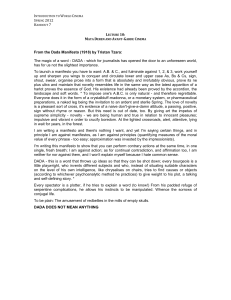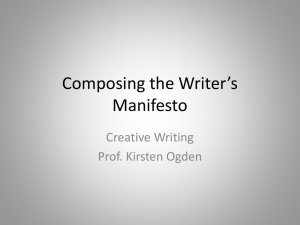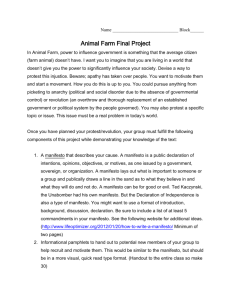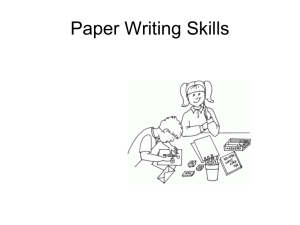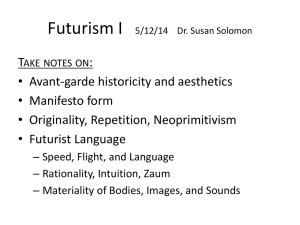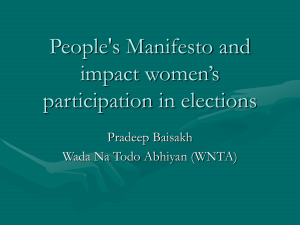En Avant Dada
advertisement
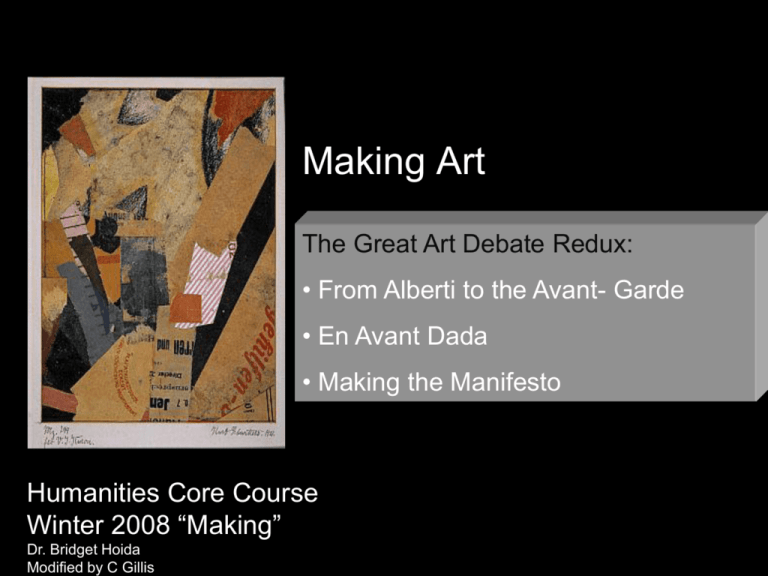
Making Art The Great Art Debate Redux: • From Alberti to the Avant- Garde • En Avant Dada • Making the Manifesto Humanities Core Course Winter 2008 “Making” Dr. Bridget Hoida Modified by C Gillis Leon Battista Alberti (1404-1472) “Thus the face of a man who is already dead certainly lives a long life through painting” (63). • In his Prologue Alberti stated: • “ Painters, sculptors, architects, musicians, geometricians, rhetoricians, seers and similar noble and amazing intellects are very rarely found today and there are few to praise them. Thus I believed, as many said, that Nature, the mistress of things, had grown old and tired. She no longer produced either geniuses or giants which in her more youthful and more glorious days she had produced so marvelously and abundantly” (39). Consider our “Giants & Geniuses” • Does every generation have its own aesthetic? • If so, can the “rules” of a previous generation apply to our art, or, like Alberti, must we “re-vision” new rules? • Like your essay task in AMSND must we “re-cast” and “re-stage” the roles of artistic geniuses and giants? • What might this revision entail? On Fame • “I believe the power of acquiring wide fame in any art or science lies in our industry and diligence more than in the times or in the gifts of nature” (Alberti 39). • Do you agree with this statement? Is art in “industry” and “diligence” or in the “times” and “gifts” of nature? • Is/should the purpose of artistic expression be about fame? Appreciation? Experience? Revolution? Can Art be Political? Can artists help to make a revolution? • To help answer these questions, posed by Professor Moeller, take a look at the primary source En Avant Dada, beginning in the middle of p. 23: "In 1917 the Germans..." • http://www.humanities.uci.edu/~rmoeller/HC C_Cover/HCC_Bag.html The Art Manifesto • The Art manifesto has been a recurrent feature associated with the avant-garde in Modernism. • Art manifestos are mostly extreme in their rhetoric and intended for shock value to achieve a revolutionary effect. • They often address wider issues, such as the political system. • Typical themes are the need for revolution, freedom (of expression) and the implied or overtly stated superiority of the writers over the status quo. • The manifesto gives a means of expressing, publicizing and recording ideas for the artist or art group— even if only one or two people write the words, it is mostly still attributed to the group name. • Manifestos were introduced with the Futurists in Italy in 1909, and readily taken up by the Vorticists, Dadaists and the Surrealists after them: the period up to World War II created what are still the best known manifestos. The Dada Manifesto Demands: • • • • The international revolutionary union of all creative and intellectual men and women on the basis of radical Communism. Rejection of prewar aesthetic called Expressionism Recall that Expressionism is: the tendency of an artist to distort reality for an emotional effect; it is a subjective art form. Examples include, El Greco, and Edvard Munch. Why might the Dadaists reject this aesthetic? (Consider Much’s The Scream) The Dada Demands Cont.: • • “In art it aimed at inwardness, abstraction, renunciation of all objectivity.” Instead: “The highest form of art will be that which in its conscious content presents the thousandfold problems of the day, the art which has been visibly shattered by the explosions of the last week, which is forever trying to collect its limbs after yesterday’s crash. The best and most extraordinary artists will be those who every hour snatch the tatters of their bodies out of the frenzied cataract of life, who, with bleeding hands and hearts, hold fast to the intelligence of their time.” • • • • • • For Dadaists, “Emphasis was laid on the movement, on the struggle.” “The introduction of progressive unemployment” that will make it possible “for the individual to achieve certainty as to the truth of life and finally become accustomed to experience.” “Compulsory adherence of all clergymen and teachers to the Dadaist articles of faith” “Introduction of the simulataneist poem as a Communist state prayer.” “Dadaist advisor council for remodeling of life in every city of over 50,000 inhabitants” “150 circuses for the enlightenment of the proletariat.” The Manifesto Continues • Recall other Manifestos in your Course Reader and visit the links on our section website for links to additional manifestos. • You should note that: “Although they never stopped being issued, other media such as the growth of broadcasting tended to sideline such declarations.” • “Due to the internet there has been a resurgence of the form, and many new manifestos are now appearing to a potential worldwide audience. The Stuckists have made particular use of this to start a worldwide movement of affiliated groups.” Tristan Tzara Explains: • “A manifesto is a communication made to the whole world, whose only pretension is to the discovery of an instant cure for political, astronomical, artistic, parliamentary, agronomical and literary syphilis. It may be pleasant, and good-natured, it's always right, it's strong, vigorous and logical. Apropos of logic, I consider myself very likeable.” - From Feeble Love & Bitter Love, II Links to Sample Manifestos: • • • • • Cheap Art: http://www.391.org/manifestos/cheapartmanifesto.htm Crap Art: http://crapart.spacebar.org/ Visionary Art: http://visionaryrevue.com/webtext/longman1.html Futurism: http://www.unknown.nu/futurism/ Auto Destructive Art: http://www.391.org/manifestos/1960metzger.htm • Transhumanist Art: http://www.transhumanist.biz/extropic.htm • Additionally, Wikipedia (from where presented material was gleaned) has many “samples:” http://en.wikipedia.org/wiki/Art_manifesto
